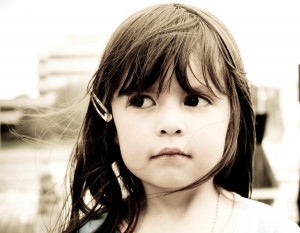This is a guest post by ‘Laura,’ mom of ‘Suzie’ and 2 other children. Suzie is currently completing high school and doing well. Laura has chosen to use a pseudonym to protect her family’s privacy.
 ‘Long time no see, Laura! How have you been? How is little Steve doing?’ I squirm a little and look at my watch when I bump into someone I have not seen in a couple of years. I’m squirming because I am anticipating the explanation that Steve is no longer Steve, which will take several minutes (at very least). Steve is now Suzie, my ‘transgender’ child, living in a different gender than the one she was assigned at birth. Some people stare when they hear my explanation. Some people ask questions. Some clearly disagree. Most listen attentively and wish us luck.
‘Long time no see, Laura! How have you been? How is little Steve doing?’ I squirm a little and look at my watch when I bump into someone I have not seen in a couple of years. I’m squirming because I am anticipating the explanation that Steve is no longer Steve, which will take several minutes (at very least). Steve is now Suzie, my ‘transgender’ child, living in a different gender than the one she was assigned at birth. Some people stare when they hear my explanation. Some people ask questions. Some clearly disagree. Most listen attentively and wish us luck.
It remains nonetheless confusing for many.
This is because ‘Suzie’ was born ‘Steve’. From the time he was crawling, he gravitated toward, selected, played with and preferred items, clothing, toys and colours which we have been accustomed to associating with girls. As an open, informed parent (so I thought), I let my child experiment with these items. Isn’t that what early childhood is all about? Sometimes people would laugh, noticing that he knew the names of all the princesses in movies when no one else did.
But then this persisted into childhood. What is a parent to do? He wanted only a mermaid outfit for his 6th birthday. He had no interest in sports or playing with other boys, but he did enjoy having tea parties with girls. What happens when your child tells you repeatedly he wishes he was a girl or simply tells you that he IS a girl?
What would you do?
I tried distracting him more and actively guiding (forcing) him towards many other interests. As I look back I guiltily realize I was actually encouraging him to suppress his ‘female’ interests. I tried and tried to involve him in a variety of sports, activities and pastimes that were more traditional to his birth sex. Steve disliked participating; he cried and was miserable. I’m ashamed to admit I once told him that he was ‘a big boy’ and that ‘8-year-old boys don’t wear nail polish, skirts, ball gowns and heels everyday.’
Gulp. Nothing changed—this child clearly spoke, dressed, behaved and above all FELT like the opposite gender.
Desperate, I consulted Steve’s pediatrician. I was referred to a pediatric doctor who specializes in gender issues right here in Montreal. Finally, the situation became clearer…..and also more complex over the course of the next few years. I learned I had not done anything wrong, my child was not ill, this was not a phase (unless a phase lasts over a decade) and yes, I was to listen to his requests and let him be, act, dress, talk and play as he feels: a girl. If need be, I was to use the pronoun that he wanted, the name he felt he should have had all along and, (gulp) let him live socially as the opposite gender.
Hormone blockers enabled us to ‘buy time’ and prevent male puberty. Hormone blockers are a sort of gift, in that they stop prepubescent children with gender identity questions from actually experiencing puberty. It is a gift because they absolutely do not want to grow facial hair (or breasts, depending on their physiological gender) and thus we can avoid the trauma, buy ourselves more time and then consider injecting hormones of the other gender so that they do grow breasts or facial hair a few years later. Though this is a reversible and safe process, it still required a lot of thought, questions and research. It was a lot to digest.
It took many months to explain this to those who surrounded us. It took a team to explain everything to the school — they had never experienced a case like this. I had to be on alert at all times. It took patience, courage and a lot of support from other parents I had met who were living the same thing. There were many worries, questions, comments and concerns for us to deal with — on an almost daily basis.
For one thing, this changed our family dynamics. Siblings have had to refer to Steve as Suzie and it changed their status at home. ‘I am no longer the only girl’, said my oldest. ‘I lost my big brother’ said my youngest. True, but we have the same person right here with us — we are getting the opportunity to discover the other side of her!
Yes, the future is uncertain and scary at time but we learn to live in the present and to accept, listen to and love her for who she is — a happier and healthier person who is true to herself! Today, Suzie attends a school outside of our community. Few people in the school are aware that she is a transgender child, because after all, she is just a child like everyone else.
Despite the successes, we faced a lot of the same questions and comments over and over. Here are some of them, with my responses:
Why can’t you just tell Steve to wait until he is an adult to this live this way? That’s what I have been doing. It didn’t work. He was miserable; he had tantrums for the smallest things. He would dress as a girl at home and be himself and then he was obliged to switch and act as someone else when the doorbell rang, when at school, during his extra-curricular activities, in front of relatives, friends and neighbours. This was negatively impacting not only his self-esteem but his academics and social interactions with peers and within his own family. I asked my own 40-year-old brother to reflect on how productive he thought he would be at work if he was obliged to wear a dress on a daily basis. No comment.
Why aren’t you seeking therapy to make him accept his own gender? What, you mean restorative therapy to change how he was born, how he feels, what his brain and heart see as his true identity? Isn’t that even more dangerous than accepting who she is?
Who is the parent here? Don’t you think a minor child is unable to make such a big decision? Yes, I am the parent and I have been questioning and reflecting for years, researching constantly and actively listening and observing my child. It comes down to a team decision between parents, doctors and the child. Believe me, any parent reflects and researches when it comes to injecting their child with hormone blockers. And then I ask people, how old were you when you knew you were a girl/boy? “I just always knew,” is what most people answer. This is what Suzie says but what she knows and feels does not match her genitalia!
Suzie now lives according to how she feels in her heart and in her brain. Yes, there have been struggles and questions. There has also been an informed and supportive group of professionals guiding us. Families living the same situation are an ongoing form of support. Supportive relatives, neighbours and decent human beings have shown kindness and respect. We even held a ‘Welcome Suzie’ event and invited all those who care.
Unfortunately, some people have distanced themselves. It hurts — very much. They lack information, compassion or they simply need more time to reflect on the whole situation — this is what I tell myself. It’s their loss. Suzie is a great kid and we have discovered a new side of who she is!
In the meantime if ever you cross paths with a child, adolescent or adult who is transgendered or who is questioning him/herself, please consider the following:
- Do not judge. Remind yourself that when a person goes to the extent of living in a different gender than the one with which they were born — a significant amount of reflection has occurred. It is a courageous, difficult; necessary ‘change’ the person must make in order to live a true, happy fulfilling life. The suicide rate for trans persons is very high. That in itself is enough to make anyone reconsider their thoughts on the matter.
- Do not ask about their genitalia — has anyone ever asked about yours? Be discreet and respectful; what is between someone’s legs does not make them a male or a female and it is no one’s business. Think about this: if you had been involved in an accident that destroyed your pelvis and your genitalia was damaged, would this impact your identification as a man or woman?
- Treat a trans person as you would any other person and remember there is a lot more to that person beyond just being trans — that person has interests, abilities, knowledge, skills and a life, just like you!
- Inform your self — there are up-to-date websites and associations that offer excellent resources: gendercreativekids.ca, TransKidsPurpleRainbow.org, Rainbow Health Ontario, l’association des transexuel(le)s du Québec, LGBTQYouthCentre in Beaconsfield).


